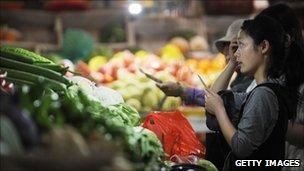China's economic growth slows amid monetary tightening
- Published
China's economic growth has slowed further in the second quarter after the government stepped up its battle against inflation.
Growth was 9.5% in the three months to the end of June compared with a year earlier. That is down from 9.7% in the previous quarter.
China says controlling prices is its top priority after inflation hit a three-year high in June.
However, other data on Wednesday showed it may be tough to slow growth further.
China's factory output grew by a better-than-expected 15% in June, while retail sales surged by 17.7%.
Analysts say further tightening measures are likely before the year is over.
Monetary measures
China has already raised interest rates three times this year, with the most recent increase coming last week.
"With inflation hitting a new three-year high in June, further monetary measures look likely," said George Worthington, an economist at IFR in Sydney.
He added that the current central bank interest rate of 6.56% could rise another 50 basis points by the end of September.
Sheng Laiyun, a spokesperson for China's statistics bureau said the government's policies would be "targeted, flexible and effective" to ensure the target to inflation under control is met.
"It's not easy and China has done a great job to maintain fast economic growth when the global situation is complex and volatile," he said.
The prospect of China's economic growth slowing has raised worries over how this might affect the world's other main economies.
However, IFR's Mr Worthington downplayed these concerns.
Wednesday's "data should also help to dispel the wilder fears of an economic collapse in China as a result of the anti-inflation fight", he said.
Stability
Despite the slowdown, China's growth rate remains one of the quickest in Asia, and the country is cementing its position as the world's second-biggest economy.
However, strong domestic demand and global problems with food production have led to an increase in the cost of food and other essential commodities, such as fuel.

The surging cost of food and fuel has become a threat to China's economic growth
This, in turn, has led to the occasional outbreak of unrest, something that the government is keen to control and limit.
Some analysts say that a slowdown in the growth rate is something China will have to accept if it wants a stable political and pricing environment.
"The biggest problem for China is not growth deceleration, it is inflation," said Chris Leung, senior economist at DBS Bank in Hong Kong.
"So in order to solve inflation, growth will have to slow down."
Credit-led growth
China's rapid expansion in recent times has been fuelled by a credit boom in the country.
As the world economies grappled with the global financial crisis, Chinese banks lent out record sums of money in an attempt to ensure that the country's high growth rate continued.
However, analysts said while the easy availability of cash had fuelled growth, it had also created issues for the government.
"You have to look at what's driving growth in China, it's mainly investments," said Patrick Chovanec, an associate professor at Tsinghua University in Beijing.
"This investment is being financed by expanding the money supply, which is fuelling inflation," he added.
Analysts also said that given the huge amount of loans that had been extended by the Chinese banks, there were concerns about asset bubbles being formed in the country.
"A lot of the investment that is going out, there is a real question being raised about whether it is going to generate return and a lot of it has started to show up as bad debt in the banking system," Prof Chovanec said.
He warned that the current path of growth in China was unsustainable.
"What we are seeing is not necessarily a strong economy, it's an economy that has been pumped up on steroids," he said.
However, Prof Chovanec said that despite the government efforts to rein in growth, a lot of people China wanted the credit-led growth to continue.
"There is a tug-of-war between those who say keep lending and let growth continue, versus those who are more concerned about inflation and want to rein it in," he said.